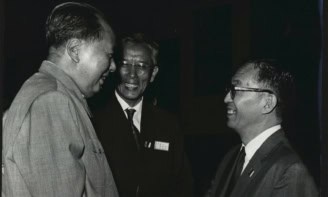By James Dacey
Do you agree with the principle of academic boycotts?
Yes
No
Have your say by taking part in this week’s Facebook poll. As always, please feel free to explain your answer by posting a comment on Facebook or below this article.
This question has arisen after it was revealed yesterday that Stephen Hawking will be boycotting a prominent conference in Jerusalem in protest against the policies of the Israeli government. The British cosmologist and science communicator had been set to talk at the Israeli Presidential Conference: Facing Tomorrow, which will take place in June and which will feature a string of high-profile speakers, including Bill Clinton and Tony Blair. But the University of Cambridge has confirmed that Hawking, who is director of research at its Centre for Theoretical Cosmology, has pulled out of the conference for political reasons. Physics World has spoken to a university spokesperson who confirmed that Hawking has sent a letter to the conference organizers to explain his decision not to take part. The UK newspaper the Guardian has today published what it says is the full text of this letter, dated 3 May.
“I accepted the invitation to the Presidential Conference with the intention that this would not only allow me to express my opinion on the prospects for a peace settlement but also because it would allow me to lecture on the West Bank. However, I have received a number of e-mails from Palestinian academics. They are unanimous that I should respect the boycott. In view of this, I must withdraw from the conference. Had I attended, I would have stated my opinion that the policy of the present Israeli government is likely to lead to disaster.”
A response to Hawking’s decision from the chairman of the Israeli Presidential Conference, Israel Maimon, has been posted on the official conference Facebook page: “The academic boycott against Israel is in our view outrageous and improper, certainly for someone for whom the spirit of liberty lies at the basis of his human and academic mission. Israel is a democracy in which all individuals are free to express their opinions, whatever they may be. The imposition of a boycott is incompatible with open, democratic dialogue.”
Others have joined the debate, including the Israel Law Center. In a strongly worded statement issued by the Israel-based organization, its director Nitsana Darshan-Leitner accuses Hawking of hypocrisy. She refers to the medical condition of the British academic, who suffers from a form of motor neuron disease and can only communicate via a synthesized voice box. “His whole computer-based communications system runs on a chip designed by Israel’s Intel team. I suggest if he truly wants to pull out of Israel, he should also pull out his Intel Core i7 from his tablet.”
Over the past few years many have spoken out in support of an academic boycott of Israel, including the British Committee for the Universities of Palestine (BRICUP) – an organization of UK-based academics set up in 2004 to respond to a call for an academic boycott of Israel issued by the Palestinian Academic Cultural Boycott Initiative (PACBI). In its mission statement, BRICUP says it opposes “the continued illegal Israeli occupation of Palestinian lands” and “its persistent suppression of Palestinian academic freedom”. BRICUP has been calling for individual academics to take specific actions, including refusing to attend academic conferences in Israel.
Proponents of an academic boycott of Israel compare their suggested actions to the boycotts of South Africa that took place during the anti-Apartheid era. Opponents of the Israel boycott, however, point out that comparisons of the present-day situation in the Middle East with Apartheid South Africa are tenuous and unjust. Some people even believe that motives within the pro-boycott lobby show a form of selective ideology that can sometimes equate to anti-Semitism. This was the view of the Nobel laureate Steven Weinberg when he cancelled a trip to the UK in 2007 after learning of a boycott of Israeli academics by the now-dissolved UK lecturers’ union NATFHE.
In a letter, published in 2007 in the Times Higher Education, Weinberg attacked what he perceived as a widespread anti-Israel current of UK opinion, especially among the intellectual establishment: “I know some will say that these boycotts are directed only against Israel, rather than generally against Jews. But given the history of attacks on Israel and the oppressiveness and aggressiveness of other countries in the Middle East and elsewhere, boycotting Israel indicates a moral blindness for which it is hard to find any explanation other than antisemitism.”
Of course, another perfectly legitimate view is to oppose the policies of the Israeli government but to also oppose the concept of academic boycotts. Commentators have pointed out that, regardless of initial motives, the outcome of severing ties between academics is to reduce dialogue and understanding. An example of the conflicts that surround the issue was observed in February this year at Oxford University in the UK, where a heated debate within the students’ union (OUSU) resulted in an overwhelmingly rejection of a boycott of Israel.
OUSU president David J Townsend was quoted in The Huffington Post. “Despite disagreements, there was in fact some common ground between proponents and opponents of the motion,” Townsend said. “I hope to see the different opinions come together in a spirit of goodwill to move away from boycotts, which break down relationships between the UK and Israel, and towards coalition-building activities, which build up relationships between progressive Britons, Israelis, Palestinians and others to find a solution to the problem which complies with law, justice and shared human rights.”
But what do you think about the issue of academic boycotts? Let us know by taking part in this week’s Facebook poll.



